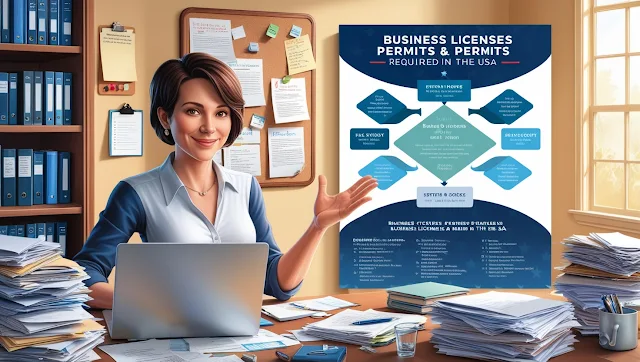In the United States, starting and operating a business typically requires obtaining various licenses, permits, and registrations. The requirements can vary widely depending on the type of business, its location, and other factors. Here’s an overview of the common types of licenses and permits you might need:
Federal Licenses and Permits
Certain businesses, particularly those regulated by federal agencies, may need federal licenses or permits. Examples include:
- Alcohol Sales: Bureau of Alcohol, Tobacco, Firearms, and Explosives (ATF)
- Aviation: Federal Aviation Administration (FAA)
- Firearms, Ammunition, and Explosives: ATF
- Fish and Wildlife: U.S. Fish and Wildlife Service
- Commercial Fisheries: National Oceanic and Atmospheric Administration (NOAA)
- Maritime Transportation: Federal Maritime Commission
- Mining and Drilling: Bureau of Safety and Environmental Enforcement (BSEE)
- Nuclear Energy: Nuclear Regulatory Commission (NRC)
- Radio and Television Broadcasting: Federal Communications Commission (FCC)
- Transportation and Logistics: Department of Transportation (DOT)
State Licenses and Permits
States regulate many types of businesses and activities, including professional services, sales, and construction. Common state licenses and permits include:
- General Business License: Required in most states to legally operate any type of business.
- Professional Licenses: Required for specific professions like doctors, lawyers, accountants, and real estate agents.
- Sales Tax Permit: Required if you sell goods or services that are subject to sales tax.
- Health Permits: Required for businesses in the food and beverage industry.
- Environmental Permits: Required for businesses that affect the environment (e.g., emissions, waste disposal).
- Building Permits: Required for construction and certain modifications to existing structures.
Local Licenses and Permits
Local governments (city, county, or town) often have additional requirements, including:
- Business Operating License: Required to operate within a particular city or county.
- Zoning Permits: Ensuring the business location is zoned for the type of business you plan to operate.
- Health Permits: Often required for restaurants, daycares, and similar businesses.
- Sign Permits: Required to put up signs at your business location.
- Fire Department Permits: Required for businesses that will use flammable materials or need regular inspections for safety.
Industry-Specific Licenses and Permits
Certain industries have unique requirements. Examples include:
- Agriculture: Permits related to pesticide use, animal health, and food safety.
- Construction: Contractor licenses, plumbing, electrical, and other trade-specific permits.
- Healthcare: Licensing for healthcare facilities and practitioners.
- Childcare: Licensing for daycare centers and in-home childcare providers.
Steps to Obtain Licenses and Permits
- Research Requirements: Check federal, state, and local regulations for your specific business type.
- Prepare Documentation: Gather necessary documents, which may include business plans, financial statements, identification, and proof of insurance.
- Apply: Submit applications to the appropriate agencies, which may be done online or in person.
- Pay Fees: Be prepared to pay application and renewal fees.
- Inspections and Approvals: Some licenses and permits require inspections or additional approvals.
- Renew and Maintain Compliance: Many licenses and permits need to be renewed periodically, and ongoing compliance with regulations is necessary.
Resources
- U.S. Small Business Administration (SBA): Offers guidance and resources for business licenses and permits.
- State Business Portals: Many states have online portals to help businesses understand and obtain necessary licenses and permits.
- Local Chambers of Commerce: Often provide assistance and resources for local business requirements.
Ensuring you have all the required licenses and permits is crucial to legally operate your business and avoid fines or shutdowns.

Comments
Post a Comment